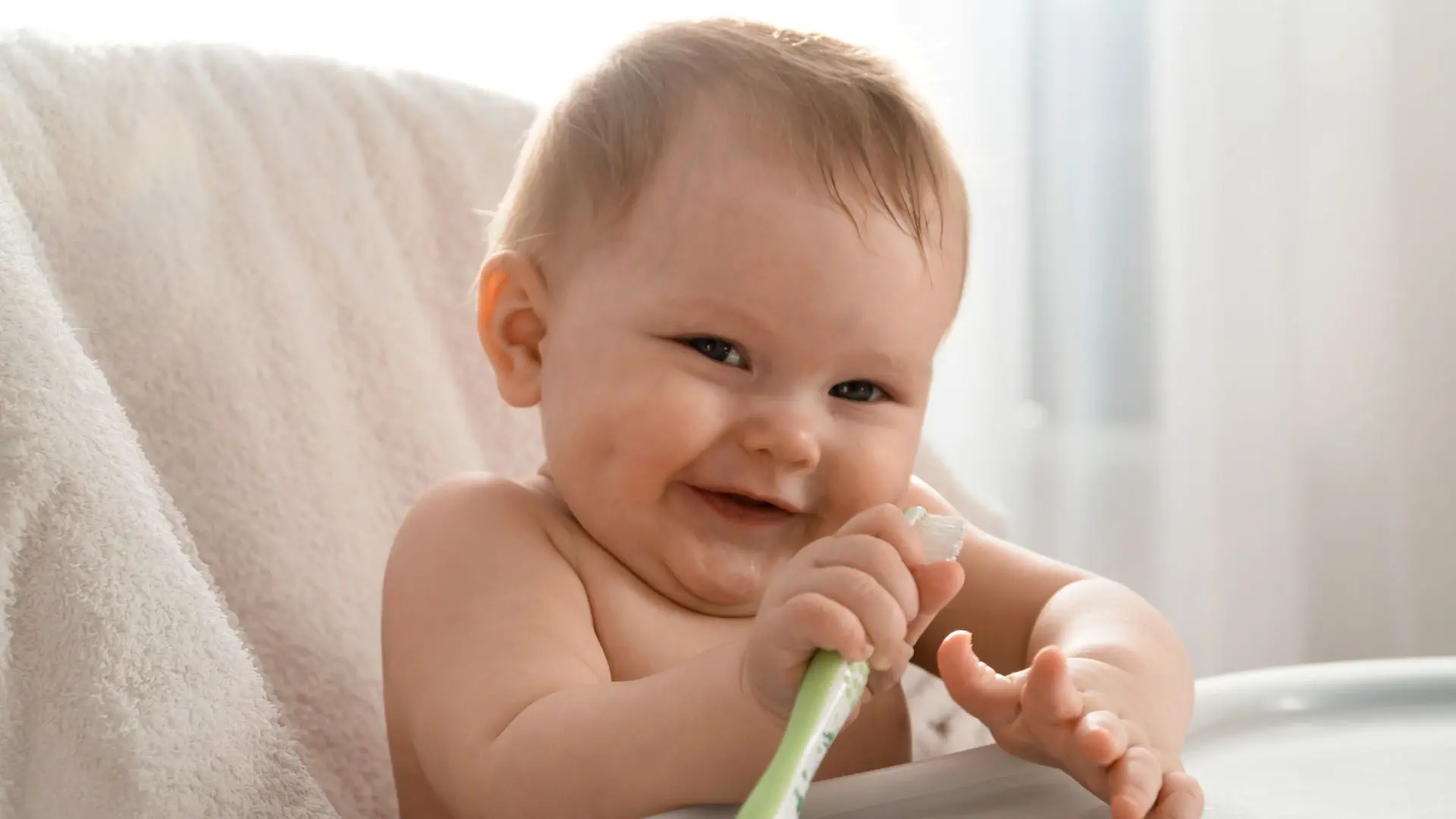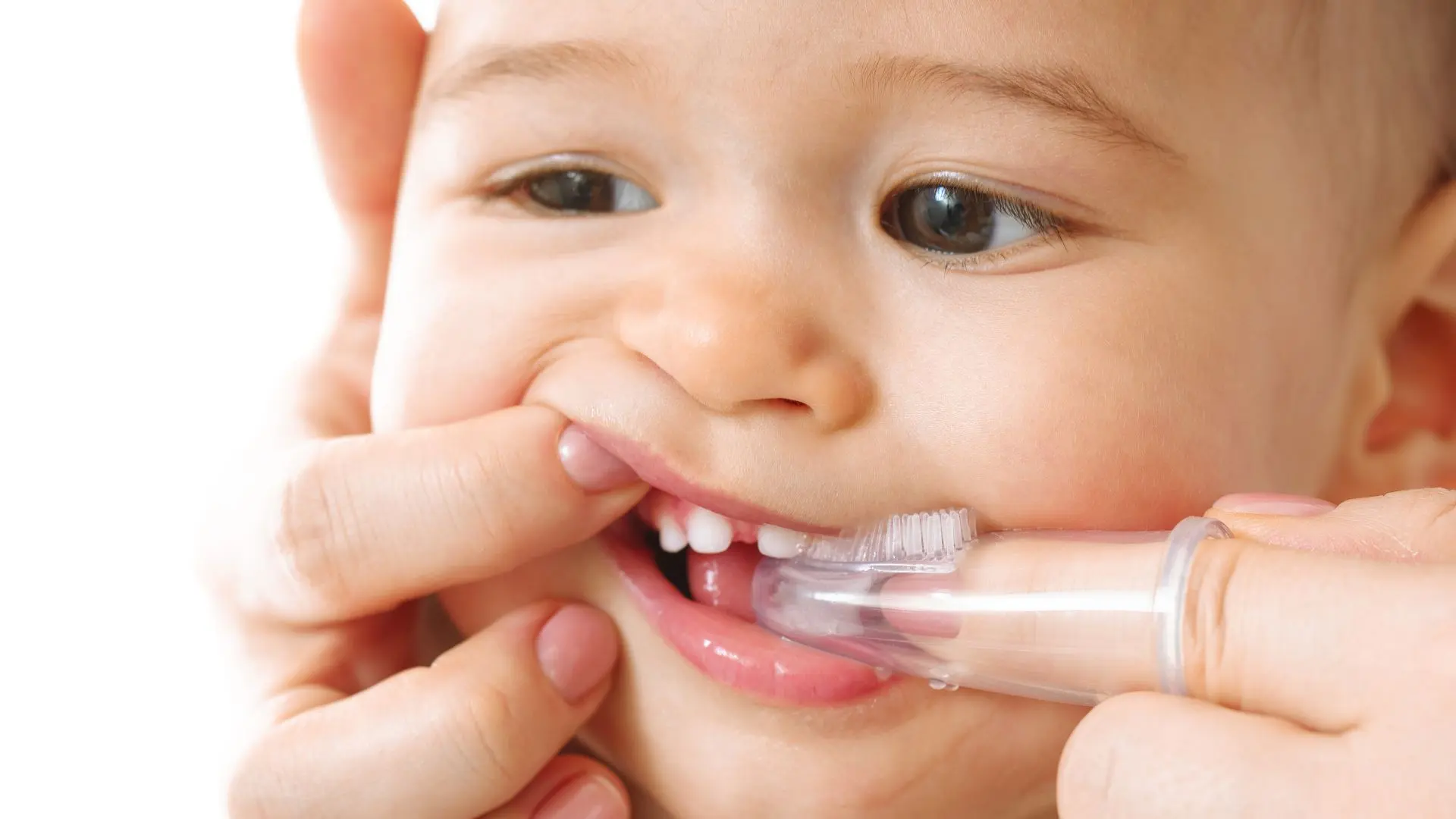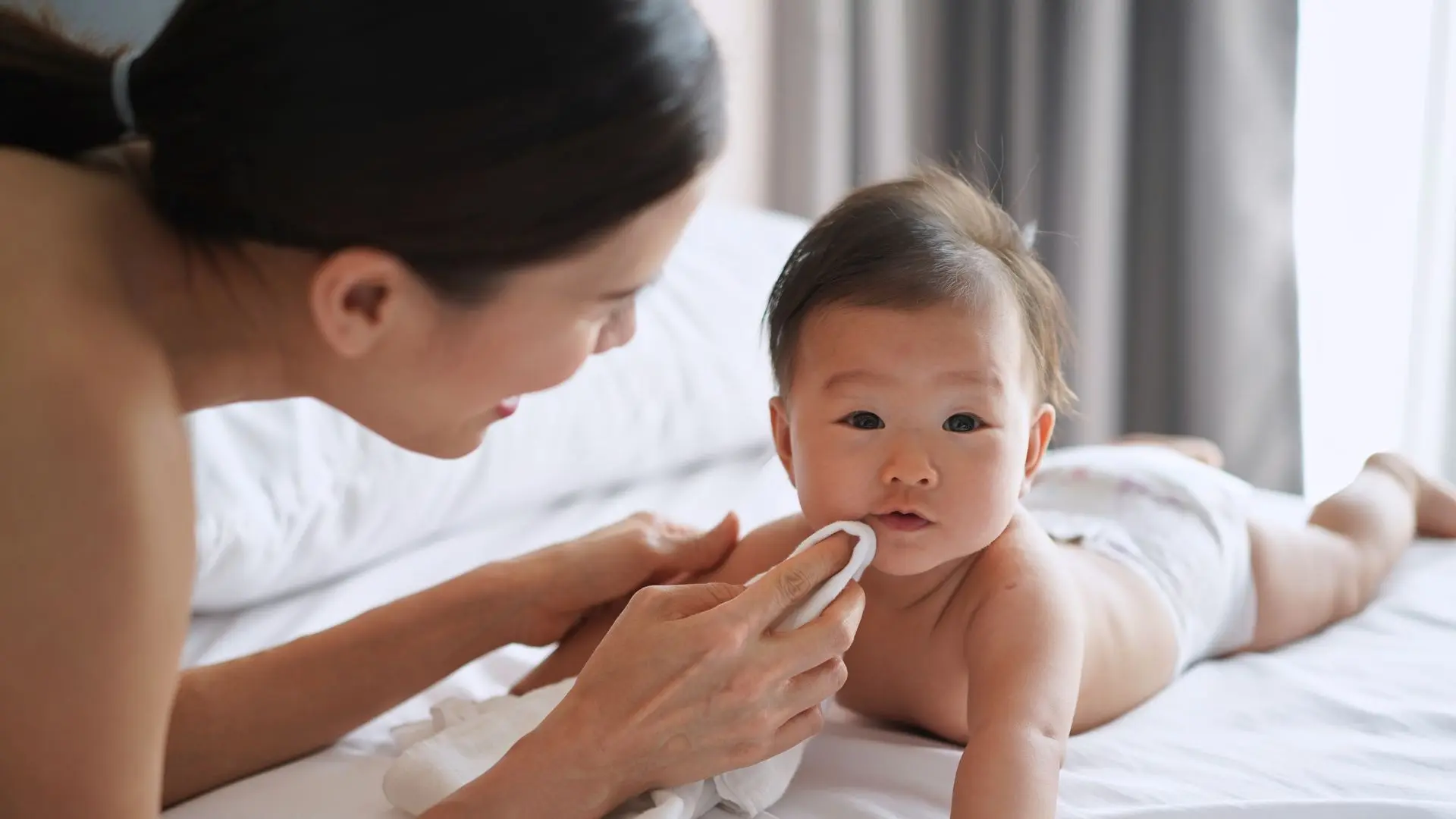Learn the best practices for Newborn Oral Care before and after teeth erupt. Expert tips and dos and don’ts to ensure your baby’s healthy smile from day one.

Your baby’s toothless smile melts your heart and feels so carefree, doesn’t it? But behind that adorable grin, there’s something important you might not have thought about—oral care. Even without teeth, your baby’s gums need attention right from the start.
Establishing good newborn oral care habits early on is key to their overall health and development. By taking these simple steps now, you’re laying the foundation for a lifetime of healthy, happy smiles that will continue to brighten your days.
In this guide, we will cover everything you need to know about newborn oral care, including what to do before your baby’s first tooth erupts, how to care for their mouth while breastfeeding, and what to do once those tiny teeth start making an appearance.
We’ll also provide you with some dos and don’ts to help you navigate this new world of infant oral hygiene. Let’s get started!
Understanding Newborn Oral Care
Many parents think of oral care as something that begins only after their child has teeth. However, caring for your baby’s mouth before teeth appear is equally important.
During the first few months of life, your baby’s mouth is a warm, moist environment, which can be an ideal place for bacteria to thrive. Even without teeth, your little one is at risk for developing oral issues, including thrush and other infections. That’s why establishing a routine of newborn gum care right from the start can have lasting benefits.
The Importance of Newborn Oral Care
Proper oral hygiene helps:
- Prevent Future Problems: Early care can prevent tooth decay and gum disease down the line.
- Promote Healthy Habits: Instilling good habits early sets the foundation for your child’s understanding of oral health.
- Support Development: Healthy gums and teeth are vital for speech development and proper nutrition.
Newborn Oral Care Before Teeth Erupt
So, what should you do before your baby’s first tooth appears? Here’s a simple, effective routine to ensure your little one’s mouth stays healthy.
- Wipe the Gums Daily: Use a clean, damp washcloth or a soft baby toothbrush to gently wipe your baby’s gums. This practice helps remove food particles and bacteria, reducing the risk of infection and promoting newborn mouth care.
- Be Consistent: Make this part of your daily routine. A quick wipe after each feeding can work wonders. Whether you’re feeding via breastfeeding or bottle, taking just a few seconds to wipe their gums makes a significant difference.
- Stay Alert for Early Signs of Teething: While most babies will start teething around six months, some may begin as early as three months. Watch for signs like increased drooling, irritability, or a desire to chew on objects. If you notice anything unusual, consult your pediatrician.
- Check for Oral Thrush: Oral thrush appears as white patches in the mouth and can be a common condition in infants. If you notice these patches, seek advice from your healthcare provider for proper treatment.
- Avoid Sugar Exposure: If you are bottle-feeding, do not put your baby to bed with a bottle filled with anything other than water. Sugary liquids can lead to tooth decay as soon as teeth emerge.
Newborn Oral Care After Teeth Erupt
Once your baby’s first tooth emerges, it’s time to shift your focus to maintaining their oral hygiene. Here’s what you need to know:

- Start Brushing: Begin brushing your baby’s teeth as soon as they appear. Use a soft-bristled toothbrush designed for infants. You don’t need toothpaste initially, but if you choose to use it, opt for a fluoride-free option.
- Twice Daily Routine: Brush your baby’s teeth twice a day—once in the morning and once before bed. Establishing this routine will make it easier as your child grows.
- Use a Smear of Toothpaste: Once your baby reaches the age of 2, you can start using a small, pea-sized amount of fluoride toothpaste. Until then, stick with a smear of fluoride-free toothpaste.
- Encourage Water Drinking: After meals, encourage your baby to drink water to rinse their mouth. This helps remove food particles and sugars that can contribute to decay.
- Begin Flossing: When two teeth touch, start flossing. Gently slide the floss between the teeth to remove plaque and food debris. Flossing might seem unnecessary for infants, but it’s crucial for preventing cavities between teeth.
- Visit the Dentist: Schedule your baby’s first dental visit by their first birthday or within six months of their first tooth appearing. A pediatric dentist can assess your child’s oral health and offer tailored advice.
Newborn Oral Care with Breastfeeding
Breastfeeding has numerous benefits for both you and your baby, including its role in promoting good oral health. Here are some important tips for newborn oral care with breastfeeding:
- Positioning Matters: Ensure that your baby is latched properly and is in a good position during breastfeeding. This not only makes feeding more comfortable for you but also helps in the healthy development of your baby’s mouth and teeth.
- Clean the Mouth After Feeding: After each breastfeeding session, gently wipe your baby’s gums with a damp cloth. This helps remove any milk residue that could encourage bacteria to grow.
- Be Mindful of Feeding Habits: Try to avoid prolonged breastfeeding, especially during the night, as this can lead to “nursing bottle syndrome,” which increases the risk of tooth decay.
- Watch for Signs of Thrush: Thrush can occur during breastfeeding and can affect both you and your baby. If you notice white patches in your baby’s mouth or have symptoms yourself, consult your healthcare provider for treatment options.
- Avoid Pacifier Use During Feeding: If your baby uses a pacifier, avoid introducing it during feeding times. This helps to ensure they latch on correctly and promotes proper feeding habits.
Recommended Newborn Oral Care Products
Navigating the world of newborn oral care products can be overwhelming. Here are some recommended items that can help you maintain your baby’s oral hygiene effectively.
- Soft-Bristled Toothbrush: Choose an infant toothbrush with soft bristles to avoid irritating your baby’s gums. Look for one that fits comfortably in your hand for easy maneuvering.
- Silicone Finger Brush: These can be helpful for gently massaging your baby’s gums before their teeth come in. They are also easy to clean.
- Oral Wipes: Look for wipes designed specifically for infants to clean your baby’s mouth. These can be handy when you’re on the go.
- Fluoride-Free Toothpaste: For babies under 2, fluoride-free toothpaste is the safest option. Make sure to choose a flavor that’s appealing to your little one.
- Teething Toys: While teething doesn’t directly relate to oral care, having safe, clean teething toys can help ease your baby’s discomfort while promoting good oral health.
- Pacifiers: If you choose to use a pacifier, opt for one that is orthodontically designed to support proper mouth and jaw development.
Dos of Newborn Oral Care
To help you remember the best practices for newborn oral care, here’s a handy list of dos:

- Wipe the Gums Daily: Establish a routine of wiping your baby’s gums after each feeding.
- Introduce a Soft-Bristled Toothbrush When Teeth Appear: Make brushing a fun activity with songs or games.
- Do Schedule a Dental Visit by the Child’s First Birthday: Early dental visits can help catch potential issues.
- Encourage Breastfeeding If Possible: Breastfeeding not only nourishes but also helps in oral development.
- Do Use Fluoride-Free Toothpaste Until the Child is 2 Years Old: Safety First.
- Supervise Older Siblings: If you have older children, monitor their interactions with your newborn to prevent accidental mouth injuries.
- Educate Caregivers About Proper Oral Hygiene Practices: Make sure everyone involved in your baby’s care understands the importance of oral hygiene.
- Do Be Aware of Signs of Teething: Recognize the signs of discomfort and find appropriate solutions.
- Do Clean Pacifiers and Bottles Properly: Avoid bacteria buildup by washing these items regularly.
- Consult a Pediatric Dentist for Personalized Advice: Your dentist can provide tailored guidance based on your child’s specific needs.
Don’ts of Newborn Oral Care
Equally important is knowing what to avoid. Here’s a list of don’ts to keep in mind:
- Don’t Use Adult Toothpaste on Infants: Adult toothpaste contains more fluoride than recommended for infants.
- Don’t Allow the Baby to Sleep with a Bottle: This can lead to tooth decay and other oral issues.
- Don’t Share Utensils with the Baby: This can transfer harmful bacteria to your baby.
- Don’t Ignore Signs of Oral Discomfort or Infection: If you notice anything unusual, don’t hesitate to seek advice.
- Don’t Use Harsh Chemicals or Alcohol-Based Wipes on the Gums: Stick to safe, baby-friendly options for cleaning.
- Don’t Neglect Regular Check-Ups with a Pediatric Dentist: Consistent dental visits are key to maintaining oral health.
- Don’t Let Pacifiers or Teething Toys Sit Unwashed: Clean these items regularly to prevent bacteria buildup.
- Don’t Skip Cleaning the Mouth Even If No Teeth Are Present: The gums need care too!
- Don’t Wait Until the Child is Older to Start Oral Care Practices: Establish good habits early.
- Don’t Panic If Teeth Appear Late: Consult a dentist for reassurance and advice.
Conclusion
As you navigate the exciting journey of parenthood, don’t overlook the importance of newborn oral care. Starting early can pave the way for a lifetime of healthy smiles and good oral hygiene habits. By incorporating simple practices like wiping your baby’s gums daily and introducing a soft toothbrush as soon as teeth appear, you can ensure that your little one has the best possible start.
Remember, it’s never too early to prioritize oral health. So take a deep breath, enjoy those adorable gummy smiles, and feel empowered knowing you are setting your child up for success in their oral health journey.
If you found this guide helpful, feel free to share your thoughts or ask any questions in the comments below. Also, consider subscribing to our blog for more parenting tips and insights related to child health and wellness. Your baby’s health is worth it.
You may also be interested in : Baby Sleep Schedule Month-by-Month Guide for New Parents